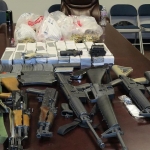UK: British firm under scrutiny for export of Bosnian guns to Iraq
The government was facing awkward questions last night over an arms deal involving a British company licensed by the Department of Trade and Industry to import weapons but which was also selling machine guns to an Iraqi official later implicated in an alleged $1.1bn (£545m) corruption scandal.
A committee of MPs and Amnesty International have both demanded to know whether the deal breaches either the UN arms embargo on Iraq or British government export laws. They want to know who was involved in the deal and what safeguards are in place to ensure arms exports negotiated by British companies through foreign intermediaries reach their intended destination.
Documents obtained by The Observer show Procurement Management Services (PMS) had a contract to provide assault rifles to Ziad Cattan, the former head of military procurement at the Iraq Defence Ministry.
PMS was licensed by the DTI, now known as the Department for Business Enterprise and Regulatory Reform (BERR), to import at least 40,000 assault rifles and AK-47s to Britain from the former Yugoslavia.
Last night the department declined to shed light on whether it knew that, in 2005, PMS also had at least one contract to supply some 300 7.62mm light-machineguns from the former Yugoslavia to Cattan at the Iraq Defence Ministry. Until mid-2005, Cattan, who used to run a pizza parlour in Poland, was responsible for overseeing the importation of weapons into Iraq. A warrant has been issued for his arrest amid allegations he illegally made millions of dollars in corrupt deals.
Supplying weapons to the Iraq government is legitimate through the correct channels and it is not alleged that the PMS deal is being investigated by the Iraqi government as part of the corruption scandal. But by law a British company wanting to export equipment from one overseas country to another must be licensed. In addition, an arms broker needs a licence to export weapons to Iraq because it is subject to an arms embargo. There is no Foreign Office record of any British company being granted a licence to transport guns between Bosnia and Baghdad.
'If a UK company did supply machineguns to Iraq from Bosnia in 2005, then such a transaction would require a UK brokering licence,' said Oliver Sprague, director of Amnesty International's Arms Programme. 'If one was issued, then questions need to be asked about what steps were taken to ensure the weapons were accounted for; if one wasn't, then the UK authorities must investigate this matter fully. Enforcement of our own export controls has been shown time and time again to be worryingly weak.'
Roger Berry, chairman of the influential parliamentary Quadripartite Committee that monitors arms exports, suggested an export licence might not have been required if the entire deal took place overseas.
'British arms brokers are completely out of control when they are operating outside the UK,' said Berry. 'If no part of the transaction takes place in the UK they don't need a licence. This is precisely the loophole that my committee argues needs to be plugged.'
The documents show in February 2005 the machineguns were shipped out of Bosnia-Herzegovina on behalf of PMS, a small company based on an industrial estate in Nottingham, and on to Baghdad. The final intended recipient of the weapons was the 'Republic of Iraq Ministry of Defence, Dr Ziad Cattan, Deputy Secretary General.'
The weapons were transported by rail and air by a little-known Croatian-registered company, Scout, which is run from a fifth-floor flat in Zagreb by Ivan Peranec, a publicity-shy travel agent turned arms dealer with links to former leading figures in the Bosnian army. Over the past five years Peranec's company has shipped thousands of weapons to registered arms dealers including the Alabama-based Taos Industries which has a $34m contract from the Pentagon to supply the Iraqi military.
The government has resisted demands from MPs and pressure groups to explain what has happened to the weapons brought back to Britain from the former Yugoslavia, many of which are believed to have found their way to Iraq.
'Our own investigations into weapons being supplied to Iraq have revealed shocking failures in the export controls process,' Sprague said. 'As a result, some of these arms are being used to commit atrocities - and no one has been held to account.'
Last week the Quadripartite Committee, which normally focuses on arms exports, took the unusual step of demanding the government explain what had happened to the weapons imported to Britain from the former Yugoslavia. The committee fears that as many as 200,000 weapons - mainly light machine guns and AK-47s - have come back to Britain without correct oversight.
'Given the volume of assault weapons coming into the country, we consider that there must be adequate monitoring arrangements to ensure none of these weapons leaks on to the streets of the UK and that, if they are part of a weapons destruction programme, they are made unusable,' the committee said in a scathing report.
PMS did not return calls made to the mobile phone or landline of one of its directors last week. A BERR spokesman said: 'We can neither confirm nor deny if Procurement Management Services of Nottingham have a licence to export or trade in weapons either directly from the UK or otherwise.'
The PMS deal may be above board, but highlights the difficulties in tracing weapons. Monitoring the vast amount of arms that have entered Iraq from a variety of countries has become an urgent priority for allied forces. Last week the US government admitted some 190,000 weapons flown into Iraq to equip its military and police forces were unaccounted for, raising concerns that they had fallen into the hands of insurgents.
- 19 Weapons Makers
- 124 War & Disaster Profiteering



